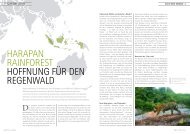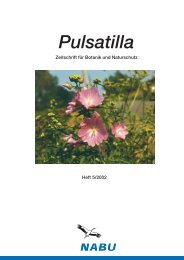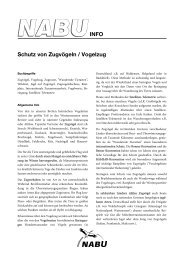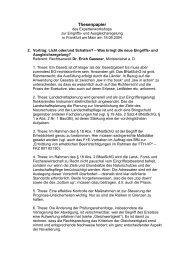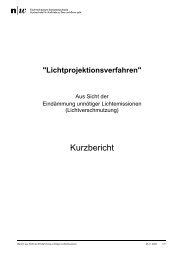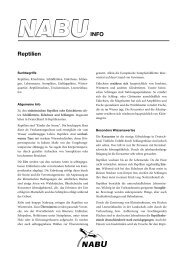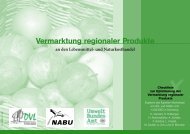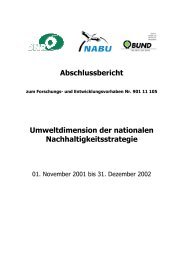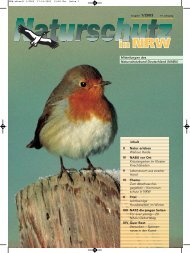Studie "The GMO-emperor has no clothes" (engl.) - Nabu
Studie "The GMO-emperor has no clothes" (engl.) - Nabu
Studie "The GMO-emperor has no clothes" (engl.) - Nabu
Create successful ePaper yourself
Turn your PDF publications into a flip-book with our unique Google optimized e-Paper software.
lobby for biotech<strong>no</strong>logy in Africa. Groups<br />
include: Agricabio, the African Agricultural<br />
Tech<strong>no</strong>logy Foundation, African Biotech<strong>no</strong>logy<br />
Stakeholders’ Forum, Africa Harvest Foundation<br />
International, the Association for Strengthening<br />
Agricultural Research in Eastern and Central<br />
Africa, and the Open Forum on agricultural<br />
Biotech<strong>no</strong>logy in Africa.<br />
Many civil society groups in Africa are concerned<br />
about the massive influence of the Alliance for<br />
a New Green Revolution in Africa (AGRA),<br />
headquartered in Nairobi, Kenya. A consortium<br />
of industry, institutes, banks, and foundations<br />
such as the Bill and Melinda Gates Foundation,<br />
AGRA aims to bring a “Green Revolution” to<br />
Africa, based on an industrial agriculture system<br />
dependent on commercial seeds and chemical<br />
inputs. Several former Monsanto officials work<br />
for the Gates Foundation, which <strong>has</strong> invested<br />
more than $34 million in shares of Monsanto<br />
stock. Many speculate that AGRA will serve as a<br />
key venue for the tech<strong>no</strong>logy’s entry into Africa.<br />
Counter to the touted claims that Bt cotton is<br />
helping small-scale farmers in South Africa’s<br />
Makhatini Flats, after five years, the majority of<br />
farmers growing Bt cotton are <strong>no</strong>w in debt and the<br />
number of farmers still growing the GM cotton<br />
<strong>has</strong> reduced by 80 percent. This story is typical of<br />
what happens throughout Africa. During the first<br />
year of GM plantings, companies and governments<br />
provide price supports for purc<strong>has</strong>ing seeds<br />
and chemicals. <strong>The</strong>y also provide infrastructure<br />
supports such as irrigation, extension services,<br />
farmer credit, and access to markets. At times,<br />
due to these supports, farmers experience a<br />
jump in income. However, after the first year of<br />
conversion, support is then withdrawn and lower<br />
crop yields and incomes result.<br />
Contamination is a central issue in Africa as<br />
Africans migrate and seeds spread easily from one<br />
country to a<strong>no</strong>ther. GM food and seeds are often<br />
dumped on unsuspecting Africans, often under the<br />
guise of being food aid.<br />
In 2006, GM rice (LibertyLink Rice), unsuitable for<br />
human consumption, was found in West Africa. In<br />
Burkina Faso, approximately 3,000 organic farmers<br />
found their cotton contaminated with GM genes.<br />
This <strong>has</strong> affected their organic certification and their<br />
ability to sell to premium markets.<br />
In South Africa, Biowatch engaged in a legal<br />
challenge with Monsanto over the right to access<br />
of information about biosafety and location of<br />
several GM crop field trials. After a protracted<br />
legal battle, the courts ruled that Monsanto was<br />
required to give the public access to most of the<br />
requested information public. However, prolonged<br />
legal procedures and expenses severely impacted<br />
the financial stability of Biowatch.<br />
A weak biosafety law, promoted by a pro-<strong>GMO</strong><br />
agricultural secretary, was passed in 2009 in Kenya.<br />
This further opens Kenya’s door to GM seeds and<br />
crops. In August 2011, the government finally<br />
gazetted rules to allow <strong>GMO</strong> foods into Kenya.<br />
This <strong>has</strong> opened a new battlefront, with activists<br />
and a group of opposing scientists plotting court<br />
actions to block the regulations.<br />
Ethiopia’s biosafety laws follow a precautionary<br />
approach to <strong>GMO</strong>s; however, some civil society<br />
groups and researchers are finding that GM seeds<br />
and crops are being brought into the country<br />
illegally (via an underground market).<br />
<strong>GMO</strong>s are allowed in South Africa; however,<br />
the Biodiversity Bill requires that <strong>GMO</strong>s be<br />
monitored, and the recently approved Consumer<br />
Act requires compulsory labeling of <strong>GMO</strong>s.<br />
In Benin, civil society led a campaign that led to<br />
the renewal of a moratorium on GM. Mali also <strong>has</strong><br />
maintained strict laws on <strong>GMO</strong>s.<br />
Voices from Asia Pacific<br />
Australia<br />
Australia was an early adopter of <strong>GMO</strong>s. GM<br />
cotton was grown in the country beginning in<br />
1996. <strong>The</strong> Florigene blue carnation, RR ca<strong>no</strong>la,<br />
and Bayer’s LibertyLink ca<strong>no</strong>la followed shortly<br />
thereafter. Licensing for these products was<br />
granted even though there was <strong>no</strong> governmental<br />
research or assessment on potential health, safety,<br />
or environmental risks.<br />
In the early 2000s, some state governments<br />
imposed temporary moratoria on the sale of<br />
GM seed. Most of the bans have <strong>no</strong>w been lifted<br />
due to intensive campaigns undertaken by the<br />
biotech<strong>no</strong>logy industry that included lobbying,<br />
marketing, and infiltrating research and scientific<br />
institutions. <strong>The</strong> intensity of the GM advocates<br />
is illustrated by a touring workshop geared for<br />
corporate executives entitled, “How to Beat<br />
Activists at <strong>The</strong>ir Own Game.” At one of the<br />
workshops, a speaker advised participants to<br />
“Take the moral high ground. …Tell politicians<br />
that when they support biotech<strong>no</strong>logy they<br />
are demonstrating much needed moral and<br />
political leadership. Conversely, you may want<br />
to point out the immorality of those who oppose<br />
biotech<strong>no</strong>logy.”<br />
40



